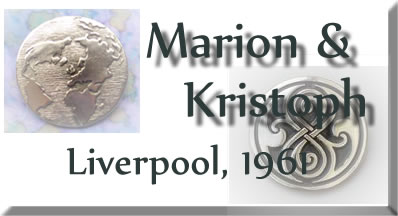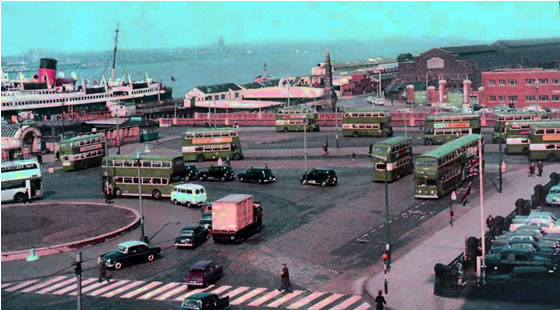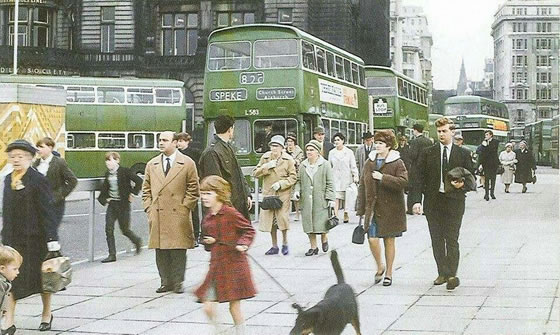

The TARDIS was parked near Pierhead again, but it was more than eight hundred years before their last visit. Marion and Margery, both dressed in styles that were part Jacqueline Kennedy and part Audrey Hepburn, walked out into a cold but bright February morning prepared to be surprised by what they found.
“It smells different,” Margery commented. “Don’t you think so, too, Marion?”
“Yes,” she answered. “It’s… sort of… smoky… oily… like coal fires and diesel engines.”
Much of what she knew as Pierhead was the same. The Three Graces stood proudly. But this was 1961, and there were marked differences.
“Look at the colour of the buildings,” she said. “Even the Graces - they’re almost black, not the creamy white they ought to be.”
“There is so much air pollution in this time,” Kristoph explained as he and Lord Stevenson joined their ladies. “Nearly everyone had coal fires in their homes and offices, trains were either coal steam or very dirty diesel and there was no such thing as catalytic converters on cars.”
“It all looks much neater, though,” Marion conceded. She looked around at the wide public square in front of the Graces. Statues on pedestals surrounded by tidy flower beds gave way to geometric patterns in coloured paving stones and benches where people could rest and watch the ships on the river.
The two women did just that. Neither had seen quite so much sea traffic on the Mersey. The ferry was crossing over to the other side while a freighter went downriver and a tug and a coal barge both steamed upriver. An ocean going liner was at the Princes Dock landing stage. On the far side, where Cammell Laird’s great cranes towered into the sky, three great tankers were lined up waiting to go into the dry dock. This was the second heyday of Liverpool as a port city after the great days of the Industrial revolution and the dark times of the war when so much of the vital waterside suffered from German bombing raids.
“I’ve never seen it as busy as this,” Margery admitted. “So many less people live in the city in my time. The park areas are usually much quieter.”
“This isn’t really busy,” Marion responded. “It’s actually quite peaceful.” There were two old men looking out across the water like old seamen with a practiced eye. Just passing the front of the Cunard building was a crocodile of youngsters in school uniform accompanied by a teacher who was pointing out the landmarks to them. A man was taking photographs of the famous waterfront and a young family were eating crisps as they walked along the riverside. Marion noticed that they all put their crisp packets into a wastebin when they were done. There was no litter around, no chewing gum ground into the paving stones. The bins had room for the crisp packets. They weren’t overflowing with beer cans and the polystyrene cartons from take away meals. She watched another man eating fish and chips from ordinary paper that he screwed up into a ball afterwards and took up far less space in the rubbish bin and wondered if there was a lesson to be learnt there.
But it was in no way what she would call busy. The same area in her own time was usually thronging with groups of people, teenage boys swaggering as they walked in their own little clique, girls in twos or threes, nearly as loud as the boys. Sometimes the mid-teens with their skateboards would occupy a section of the pathways and ordinary pedestrians would give them a wide berth. There would always be two or three down and outs with their plastic bottles of cheap cider or a carry out of lager cans. There were more people, and noisier, messier.
Of course, Margery had already explained why it was so much quieter in her day. People had migrated to other planets and Earth cities were not as busy as they used to be. That was all right. It wasn’t some nightmare future like the science fiction films portrayed.
Even so, this nineteen-sixties Liverpool or the one she knew some thirty years later, felt more right to her.
“Goodness, what is THAT?” Margery asked as a loud noise drifted towards them from the top end of the park.
“It’s a horn, on a bus,” Marion answered her. “My goodness, I’d forgotten all about the old bus depot. Oh, I have to look at that.”
She actually quickened her step, surprising Margery, who had to change her pace to match.
To ordinary Liverpudlians of the time, there was nothing especially picturesque or remarkable about the Pierhead bus depot. It was a collection of shelters and numbered stops and a wide turning circle where green-liveried double-decker buses deposited their passengers and took on new ones. It had a temporary look to it, as if the whole thing might be demolished and remodelled at any time, but Marion knew it would still be there when she was a little girl. She could remember catching buses from here with her mother or grandparents after crossing the river by ferry.
And yet she had forgotten it until today. She had got used to the new bus terminus at Queen Square, and even the different colours and styles of buses in her time. These ones still had conductors. Long before she was a teenager they had changed to the one man operations where passengers paid the driver as they got on the bus.
“I’ve never seen a real one,” Margery said in an awestruck tone. “Let alone so many of them in one place.”
“They’re… just buses,” Marion answered her. Margery was looking at them as if she had been transported to the Jurassic era and was witnessing a herd of brontosaurus at a watering hole.
“They’re amazing,” Margery insisted. “So many people, going so many places, in these huge vehicles. The smell is terrible, and the noise, but they ARE amazing.”
Lord Stevenson laughed softly as he took his wife’s arm.
“My dear, I never knew you were so addicted to diesel fuel. It is terrible stuff, you know. People in this time didn’t even realise the damage they were doing to their own environment.”
“Oh, I know that, but just look at it… the sheer effusion of humanity, all going about their own lives. I never thought to see so much in one place.”
“I never realised you had been so very sheltered,” her husband teased. “I think I should take you to visit the third class section of the Venturan space port, where they examine all the would-be immigrants.”
Margery laughed, but there was a ring of truth to it. She rarely moved among any but her own class in refined, cultured circles. She had never queued for a bus. When she went shopping a limousine brought her to the store and the manager generally accompanied her and attended to her needs. If she went to the theatre or to a sports event, it would be to a box or grandstand separate from the crowds. No wonder this ordinary scene was so breathtakingly new to her.
Marion had lived the same sort of life for the past few years, but before then she had been an ordinary woman who caught buses and had to wait her turn at the checkout. Every so often she still did that. The kitchen cupboards at Mount Lœng House on Gallifrey were stocked with such exotic imports as PG Tips tea, McVities biscuits and Robinsons marmalade, as well as assorted flavours of jelly that Rodan enjoyed for her tea. Marion enjoyed the ordinariness of shopping days like that. They helped her to remember where she came from.
Perhaps Margery needed to come on one of those shopping trips and experience the joy of putting a coin in the shopping trolley.
“If you really want to enjoy crowds I have an interesting idea,” Kristoph said. He was looking at a poster inside one of the bus shelters. “We don’t need to take a bus, I am afraid. It’s only a ten minute walk at the most.”
Margery looked longingly at the Leyland bus that had just pulled up near them and turned away from the compelling sight. Lord Stevenson took her arm again. Marion walked with Kristoph, enjoying what was at once familiar and unfamiliar.
Lord Street, where she had bought most of Rodan’s baby clothes was new and fresh. That whole shopping area had been constructed in the 1950s on the site of some of the worst bombing of the war. It was intended to sweep away the bad memories and herald a new era of progress and prosperity.
And in 1961 it did just that. Familiar facades like British Home Stores and Marks and Spencer were bright with their plate glass windows filled with consumer goods and latest fashions. Smaller shops with unfamiliar names stood side by side with them. Marion didn’t recognise many of them. In her day franchises like Footlocker and MacDonalds had replaced them.
Mothercare was still there. Marion looked at the store longingly.
“Let me buy that little sailor suit for Remy,” she said. “It would fit him beautifully.”
Kristoph laughed.
“Later,” he said. “Right now we have a lunchtime appointment.”
She still wasn’t sure where they were going, exactly. At least not until they turned off Lord Street into North John Street and from there left the modern shopping centre for a dark, narrow cobbled lane dwarfed by the multi-story buildings on the main streets. Marion barely recognised the place Kristoph was bringing them to even though it was still there in her time. It had been refurbished and redeveloped many times since the 1960s.
The club that promised lunchtime musical entertainment wasn’t there in the 1990s. It had been demolished many years before. But its historical significance was recognised by a special blue plaque and street statues. Marion gasped in surprise as she caught on.

“This is the Cavern, in Mathew Street,” she said. “Kristoph… do you mean… 1961… Oh….”
“Today, in half an hour, the Beatles play their first lunchtime concert here,” he said. Margery gave a soft sigh of delight. “Arthur and I are going to look like a pair of old fogies among all the youngsters, but you two should fit in. Try not to scream or faint. This IS their first time here. They’re not really famous, yet. Keep it in proportion, my dears.”
Marion and Margery both smiled at his teasing. They didn’t care. This was something anyone born in Merseyside knew about. They were VERY excited. They positively danced down the steps into the basement hall that would probably not pass the more stringent fire regulations of Marion’s own time and was certainly not accessible by wheelchair users.
“The young man taking money at the door thinks we’re your fathers,” Lord Arthur said to the women with a wry smile. “I think we old men ought to sit down quietly over here and rest our ancient bones.”
Marion and Margery had both married men considerably older than they were – in Marion’s case very MUCH older, but they had never worried about it before and weren’t going to worry about it now. They enjoyed coca cola served in glass bottles with a straw, something else Marion hadn’t seen since her childhood as ‘safe’ plastic bottles replaced the elegantly curved glass.
This wasn’t yet the preserve of teeny-boppers. The Cavern was still known as a jazz club that was just expanding into more popular music. The Beatles had struggled to convince the management to give them a lunchtime slot.
It was by no means a packed house. By the end of this year, it would be a different matter, but this afternoon there were only a few patrons who might be called fans of the Beatles. A small group of young men and women hovered near the tiny stage where the four man combo were crammed listening avidly to what would become the beat that defined the 1960s.
Marion and Margery were among that crowd. They clapped enthusiastically at the end of each set and drank in the uniqueness of the moment. It was unique to them especially because they knew what a musical phenomenon was beginning tonight.
“John was always my favourite,” Margery sighed when they walked back through the streets of 1960s Liverpool, back to Pierhead where the TARDIS was parked. “It was amazing to see him so young. Especially… knowing how it would end for him.”
“I remember,” Marion said. “November 1980. I was only young. I didn’t even really understand what it was all about. But people cried in the streets. I’m glad to be able to come back here to when it was all new and they were young and hopeful.”
“Are you ready to go back to the future, now?” Lord Stevenson asked. “Margery, my dear, have you seen enough crowds, enough buses, to last you for a while? Your mother is expecting us for dinner in the twenty-eighth century.”
“Yes,” Margery answered.
“And tomorrow, back to Ventura,” Kristoph added. “We have to pick up our fosterling before she becomes the youngest show-jumping champion on the planet.”
“She wants to see Father Christmas before we go back to Gallifrey” Marion told him. “We’ll be back in Liverpool again.”

 |
 |
 |